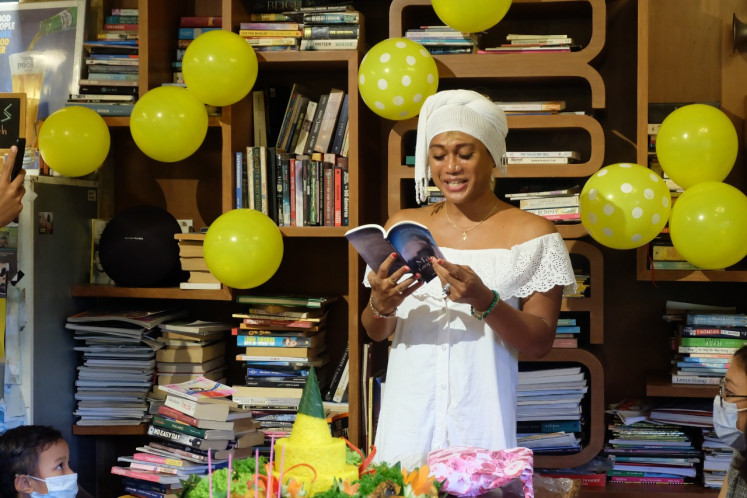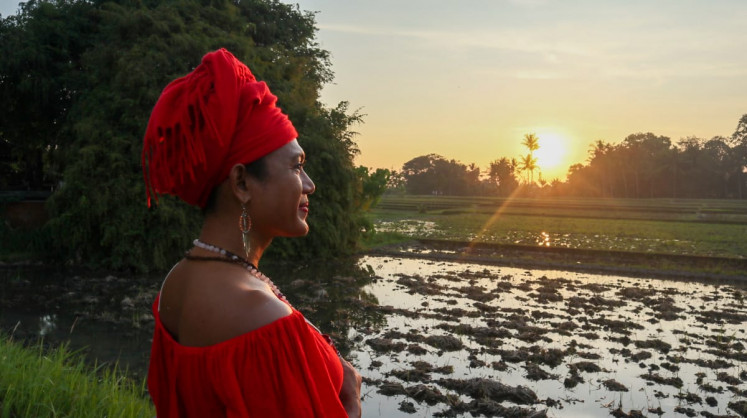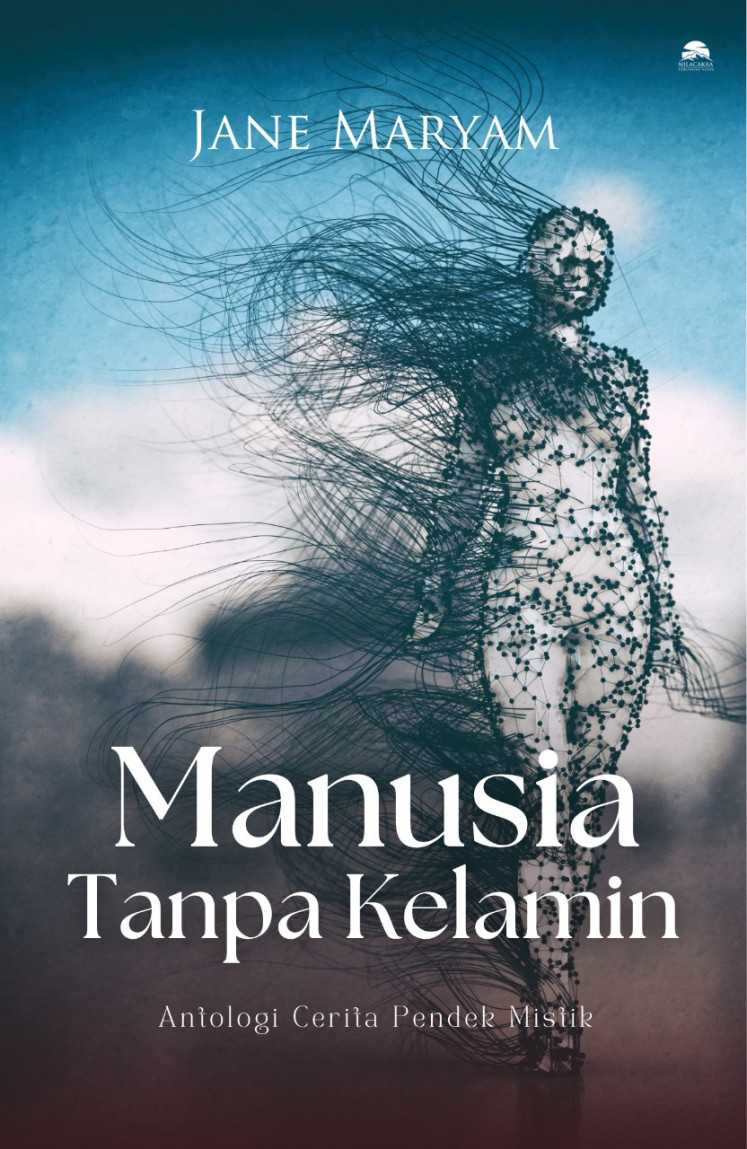Popular Reads
Top Results
Can't find what you're looking for?
View all search resultsPopular Reads
Top Results
Can't find what you're looking for?
View all search resultsCollection ‘People Without Genitals’ is equally humane as it is spooky
Short story collection Manusia Tanpa Kelamin (People Without Genitals) puts forth contemporary issues through a fictional lens.
Change text size
Gift Premium Articles
to Anyone
Short story collection Manusia Tanpa Kelamin (People Without Genitals) puts forth contemporary issues through a fictional lens
Imagine if every single human being was born without sexual organs. Would we be able to stop sexual abuse and control our lusts?
In the title story of her latest short story collection, Manusia Tanpa Kelamin (People Without Genitals), author Jannah Maryam Ramadhani (pen name Jane Maryam) invites her readers to visualize such a scenario.
In this fictional universe, humans can still function properly despite lacking sexual organs. They use their mouth for every biological purpose, including defecating and procreation. The story shows them as living an easier life, without sexual desires – a contrast to humanity in the real world, which Jane presents as driven by lust and greed.
Launching: Jane reads "Manusia Tanpa Kelamin" (People Without Genitals) during the book launch at Little Talks in Ubud, Gianyar, Bali on Nov. 21, 2021. (Personal Collection/Courtesy of Gustra Adnyana) (Personal Collection/Courtesy of Jane Maryam)Other titles among the collection’s 16 stories deliver similar forms of unnerving fiction to make the readers mull in cerebral discomfort. In I Don’t Believe in Ghosts, an Indonesian woman named Jenar decides to challenge her Western boyfriend Bryan to prove his love by spending one night in a graveyard. Bryan claims that he does not believe in ghosts, unlike Jenar. Jenar then asks her friend, Tia, a trans woman who also happens to be a clairvoyant, to accompany them during the dare.
All of them later find out that actions have consequences—seen and unforeseen.
Jane currently resides in Tabanan, Bali where she works as a yoga teacher as well as a wellness coach and meditation instructor.
“This collection of short stories is inspired by my spiritual journey in Bali,” Jane said.
“On this island, we cannot separate between those who are ‘seen’ and ‘unseen’ […] Balinese spiritual leaders and their storytelling, as well as Balinese folktales, enrich my understanding of the development of Balinese esotericism,” she continued.
In her other stories, the Bali-based writer features other Indonesian myths and folklore such as the pelet (a powerful Javanese love spell), leak (a Balinese mythological figure in the form of a flying head with internal organs still attached) and melik (Balinese for a person with supernatural traits).
Most, if not all, stories in Manusia Tanpa Kelamin will send a chill down the spine of readers. But Jane keeps the focus toward her characters – everyday folk often misunderstood by society. In one story a Javanese widow becomes the talk of the town after her husband suddenly dies two years into their marriage, in another a gay man tries to break a family curse despite objections from his elder siblings.
Second book: In "Manusia Tanpa Kelamin" (People Without Genitals), Jane features LGBTQIA+ characters and other individuals 'othered' by society. (Personal Collection/Courtesy of Firman Hidayat) (Personal Collection/Courtesy of Jane Maryam)Jane wrote Manusia Tanpa Kelamin sporadically over the past couple of years as the COVID-19 pandemic hit the world. Initially, Jane wanted to write a novel like her first book, Menikah (Married), published in 2015. She conceded however that writing short stories would be more feasible with her target of publishing by the end of 2021.
“The writing process came about rather quickly. Maybe because it’s a bunch of short stories, so they were easier to write. Plus, they were essentially excerpts from the novel that I initially wanted to publish,” she said.
Those familiar with feminist author Intan Paramaditha’s fictional work Sihir Perempuan (Black Magic Woman) might note slight resemblances to Jane Maryam’s short story collection. Intan’s Sihir Perempuan features short stories of women from different walks of life who become entangled with ghosts and mythical creatures while dealing with their own issues.
However, while Intan’s Sihir Perempuan contains several pop culture references, Jane’s stories use more down-to-earth settings. While the women in Sihir Perempuan are either scorned or vengeful, Jane Maryam’s characters are more reflective in narrating their own foibles.
The cover: Written by Jane Maryam, Manusia Tanpa Kelamin (People Without Genitals) was launched on Nov. 21, 2021. (Personal Collection/Courtesy of Nilacakra) (Personal Collection/Courtesy of Jane Maryam)Seen and unseen
Manusia Tanpa Kelamin is Jane’s second book. Her first novel, Menikah, shares marriage stories of Indonesian women from various backgrounds, sexual orientations and gender identities.
Jane received her master’s degree in social psychology from the University of Indonesia in Depok, West Java in 2017, following her bachelor's in psychology from Diponegoro University in Semarang, Central Java, in 2008.
According to Jane, Balinese people, and Indonesians in general, live side by side with myths, esotericism and metaphysics. This has inspired her to write stories that could encourage social discourse by incorporating local myths and folklore that already include wisdom such as tolerance and empathy.
“Upon first read, readers may perceive this book as a work of horror or mysticism, but underneath it all, there are messages I want to put forward about the noble values that are inherent in all of us as humans, which we need to continuously uphold in our interactions with one another,” Jane added.
Manusia Tanpa Kelamin casually features LGBTQIA+ characters without making a big deal out of their identity. Jane acknowledged that she was inspired by stories of LGBTQIA+ around her. Having first been involved with the Indonesian Women Coalition in the mid-2000s, Jane has years of experience meeting people from sexual and gender minorities and helping them deal with their issues.
“As I continued my studies for my master’s degree in social psychology I also became more involved in issues related to gender and sexuality minorities through my research,” she said.
In the end, Jane hoped that Manusia Tanpa Kelamin could inspire readers to appreciate local cultures and wisdom better, especially facets that might be “othered” by the majority.
“I think the title of this book alone might already provoke certain preconceived notions on the public’s part. So it’s important to approach this type of literary work first and foremost with a sense of respect for differences, no matter one’s point of view or religious belief, for instance,” she concluded.
Manusia Tanpa Kelamin
Hardcover, 141 pages
Published November 2021 by Nilacakra














